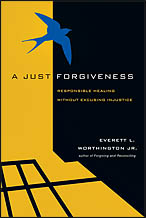Everett Worthington: A Just Forgiveness

Everett L. Worthington, Jr., A Just Forgiveness: Responsible Healing without Excusing Injustice (Downers Grove: InterVarsity Press, 2009) 252 pages, ISBN 9780830337014.
Since this reviewer has sat under Worthington in a seminar setting in an American Association of Christian Counselors (AACC) national meeting, it is a personal pleasure to review this book of his which seeks to “titrate” justice and forgiveness in order to either foster reconciliation or restore lives where reconciliation may be impossible to attain. “Just forgiveness” is one where both justice and forgiveness is served. Worthington identifies that humility is what brings justice and forgiveness together. Such an interconnection is accomplished “by a Trinitarian God who understands such interconnections” and is able to lead individuals, groups, and societies “to humble just forgiveness and peace” (p.230).
Worthington, who received his Ph.D. in Psychology from the University of Missouri (Columbia), is professor of Psychology at Virginia Commonwealth University (Richmond), and also an active member of the AACC, and is known for his work in marriage counseling. This reviewer owns one of his works in that area. In his A Just Forgiveness, Worthington starts off by discussing the place of forgiveness in marital and family relationships before continuing to show how forgiveness and responsible healing can take place in church, business, community and society, and the world at large where “injury has occurred” while also upholding the case for a “rational and relational justice” (p. 59).
The book is essentially divided into two sections. The first one hundred twenty-six pages concentrates on what just forgiveness entails. Those pages also delve into the tensions involved, the questions raised and the humility that is required for resolution of differences and hurts and restoration. The second part discusses how just forgiveness can result in family situations, within churches, workplaces, communities, and the world. He makes distinctions among distributive, retributive, procedural and restorative kinds of justice and shows how each works itself in actuality. Similarly, Worthington distinguishes decisional forgiveness and forgiveness from the heart and makes the case for a forgiveness that needs to be both rational and affective. One without the other does not bring about resolution, restoration, and/or reconciliation.
There is one place where Worthington follows Max Weber’s sociological distinction between “church” and “sect,” while recognizing their commonality as a community of believers (p.150). The sect usually arises “in opposition to an established church and organize around a person” (p.150) while a church is what emerges as a sect grows and becomes “unwieldy and unable to operate on the basis of a single leadership” (p. 150). Jesus, however, never made such a distinction. Since the term “church” describes those who “belong to the Lord,” no matter the size, degree of organization, and type of polity, sect and church are much the same in having the same submerged personality conflicts regardless of differences over polity, beliefs, or ethical standards.
One of the most interesting discussions in the book is in chapter nine where Worthington takes on the issue of just forgiveness in the world where he describes violent cultures, the role of prejudice, the origins and types of societal violence, and the underlying factors which lend themselves to the persistence of societal violence. Worthington examined the Amish response to the Nickels Mine Massacre of school children in Lancaster Co., PA; the South African Truth and Reconciliation Commission experiment, the Colombian limited amnesty program, and the Rwandan Gacaca court trials (having to do with the 1994 Rwandan Genocide).
Category: Living the Faith, Summer 2011


